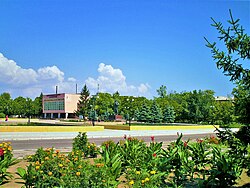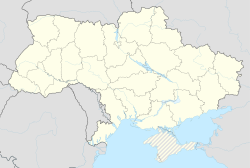Oleshky
|
Oleshky Олешки |
||
|---|---|---|
 |
||
|
||
| Location of Oleshky | ||
| Coordinates: 46°38′00″N 32°35′00″E / 46.63333°N 32.58333°ECoordinates: 46°38′00″N 32°35′00″E / 46.63333°N 32.58333°E | ||
| Country |
|
|
| Oblast | Kherson Oblast | |
| settlement | 1784 | |
| city | 1802 | |
| Government | ||
| • Head of City Council | Dmytro Mykolayovych Voronov | |
| Area | ||
| • Total | 15.7 km2 (6.1 sq mi) | |
| Population (2015) | ||
| • Total | 25,098 | |
| • Density | 1,598/km2 (4,140/sq mi) | |
| Postal code | 75100 | |
| Area code(s) | +380 5542 | |
| Climate | Cfa | |
| Website | http://www.oleshki.org.ua/ | |
Oleshky (Ukrainian: Олешки) is a city in Kherson Oblast (province) of Ukraine, located on the left bank of the Dnieper River. It is the oldest city of the oblast and one of the oldest in the southern Ukraine. As of 2001, its population was 30,123. Its population was 25,098 (2015 est.).
The Konka River goes through the town before falling into the Dnipro. The Oleshky Sands are located in a close proximity to the town.
The city of Oleshye (Oleshia) has been known since the 11th century, when it was a part of Kievan Rus', but the area itself has been known since antiquity.Herodotus mentioned Scythian forests in the mouth of the Dnieper in the 5th century BCE, which were called "Oleshye" (from the Slavic word for forest) by the Slavs. The city, which appeared later, took its name from the area, and the later form of the name (Alyoshki/Oleshky) is also related.
In 1711-1728, Oleshky was the capital of the Zaporizhian Host under the protection of the Crimean Khanate. In 1784, the settlement of Oleshky was established; by 1790, it became a part of the Kinburn palanka of the Black-Sea Cossacks. In 1802, the settlement was granted town status and became the seat of an uyezd in Taurida Governorate. In 1928, the town was given name, after Alexander Tsiurupa, the former Soviet Trade Minister and the chief of Gosplan who was born in the city.
On 21 November 2007, the city council adopted resolution No.296 to restore the name Oleshky. The city council deputies and district councils, as well as the local Cossacks, wrote a letter to then president Victor Yushchenko requesting that the petition be carried out.
...
Wikipedia


